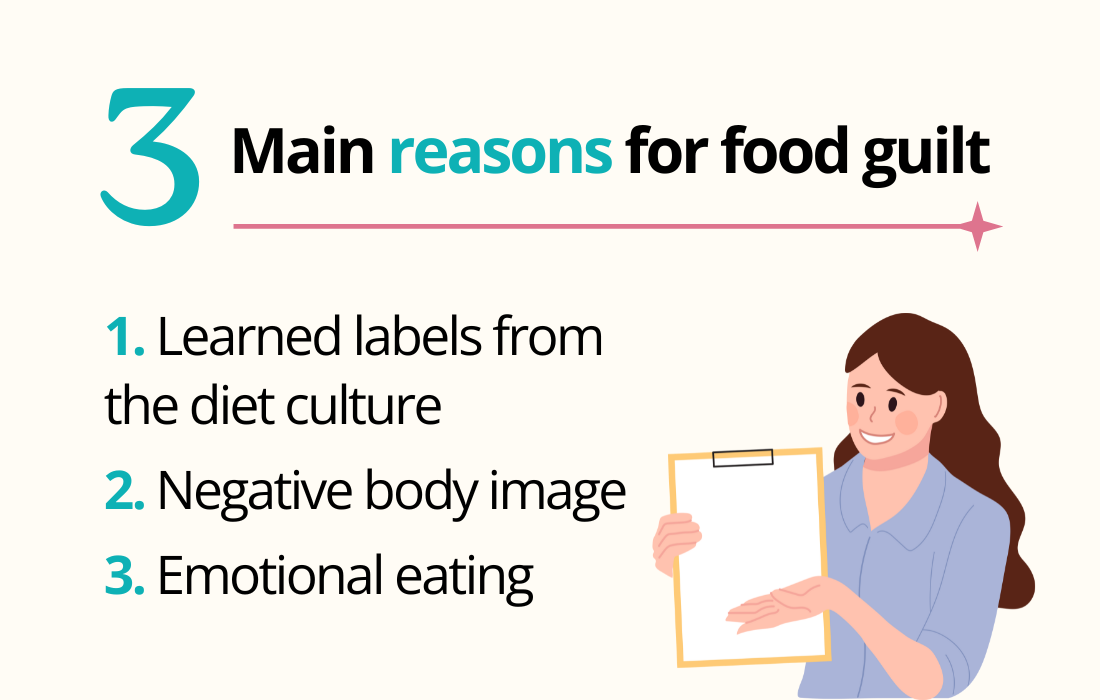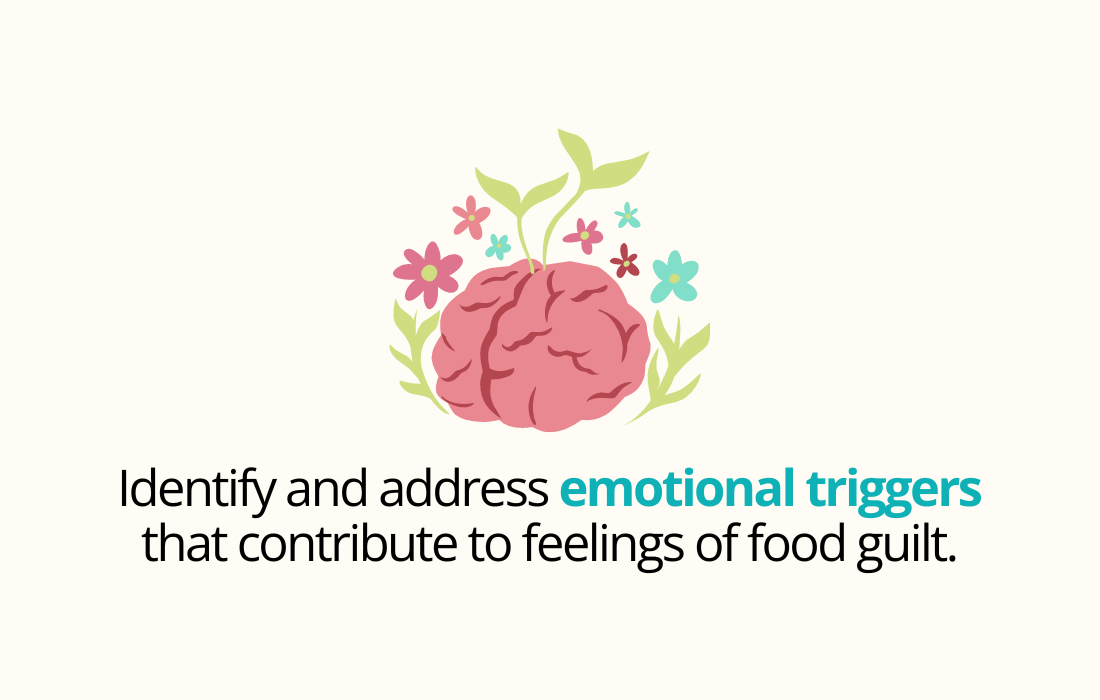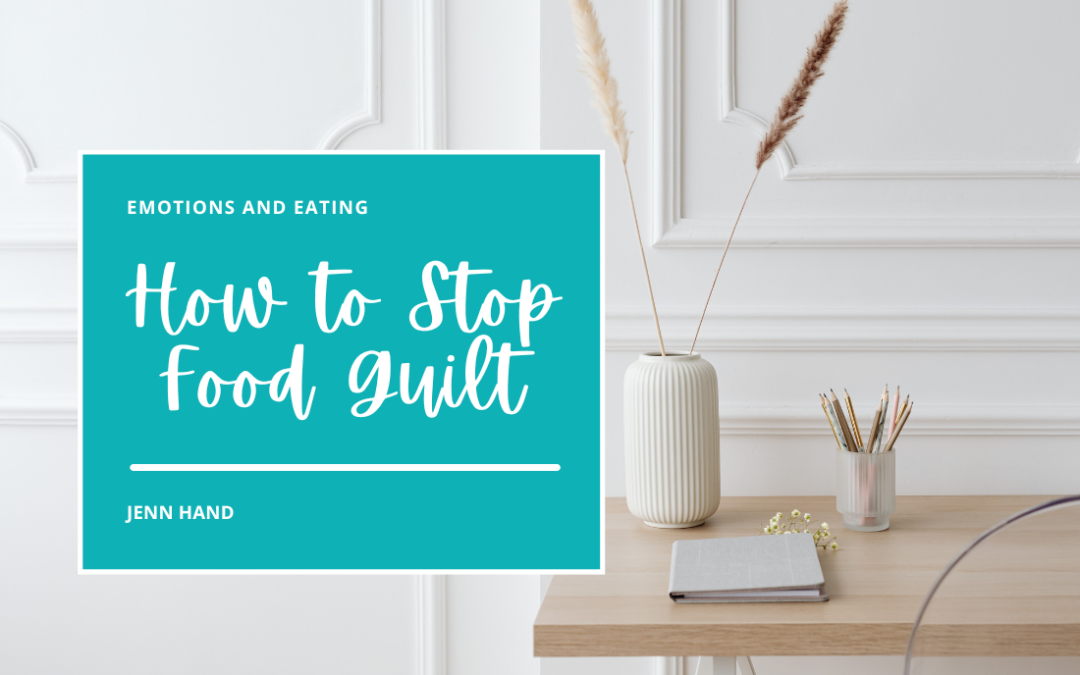First, what IS food guilt? Food guilt refers to the negative emotions and feelings of remorse or shame we feel when we eat certain foods. In this post, I’ll cover how to stop food guilt so you can truly enjoy your meals.
Written by Jenn Hand, Holistic Nutritionist, Board Certified Health Coach and Binge & Emotional Eating Coach, NBC-HWC
If you’re feeling guilty about what you ate (or still feeling guilty from something you ate 3 days ago!), you’re not alone.
Guilt comes up A LOT with the woman I talk to.
Guilt over eating 6 too many cookies. Guilt over having a third bowl of ice cream when you promised yourself you wouldn’t. Guilt over not going to the gym when you said you would. So much guilt in this whole mess!
It’s a tricky emotion that guilt. It’s a hard one to work through because it’s often tied in with so many other emotions…hating your body, feeling like a failure, being ashamed, etc.
As women, we feel guilty about so many things (not just food). We feel guilty for saying no, for not helping a family member when it’s what we “should” do, for taking time for ourselves when we have children, and for a million and one other things that go on in our lives.
It’s time to let go of our guilt!
(I’ve gotten better at this, but still feel guilty very often. Not necessarily around food anymore, but for telling a friend I don’t want to do something, for refusing to go to 15 family parties when I’m visiting home, for stating my needs in my relationship…for any and everything!)
Bottom line: You CAN let go of feeling guilty about what you ate, though! You’re not doomed to feel guilty every time you have something you “shouldn’t have”.
Food guilt was a huge hurdle for me to overcome in my own healing from the binge-and-restrict cycle.
A few examples from my own journey:
- Feeling guilty after eating a piece of cake at a birthday party
- Immediately regretting eating a large portion of fries with lunch
- Beating myself up for having an extra piece of pizza because it’s not “healthy”
- Feeling shame for promising myself I wouldn’t eat sugar and then having dessert
- Immediate guilt upon eating more cookies than I thought I “should” have
Three main reasons for food guilt include:
1. Learned labels from the diet culture
Following strict diets and labeling foods as “good” or “bad” can lead to guilt when we don’t follow the “rules.”
Food guilt often stems from internalized beliefs about what foods are “good” or “bad” based on societal standards and diet culture. If your mind says that a food is unhealthy or too indulgent–you may feel guilty about eating it.
2. Negative body image
Food guilt can also arise from concerns about body image and weight.
We may feel guilty for eating foods that we fear will cause weight gain or that would impact how our body looks. This guilt is often fueled by unrealistic beauty standards perpetuated by society and media.
3. Emotional eating
Using food as a coping mechanism for stress, boredom, or sadness can lead to a guilt trip afterward.
We might feel guilty for turning to comfort foods during a tough day at work or after a breakup. Feeling guilty after emotional eating is all too common.

4 Ways to Stop Food Guilt from Taking Over
1. Challenge the diet tapes in your brain
Question and challenge beliefs rooted in diet culture that make us think we need to feel food guilt.
Recognize that all foods can fit into a balanced way of life. Reject restrictive dieting practices that perpetuate guilt and instead embrace a flexible approach to eating based on self-care and nourishment.
2. Focus on satisfaction
Shift your focus from rigid food rules to exploring what you find nourishing and balancing.
Prioritize foods that provide physical nourishment and satisfaction, rather than solely focusing on calorie counts or nutritional labels. Allow yourself to savor and appreciate the flavors and satisfaction that food can bring without attaching guilt to your choices.
3. Look at your emotional triggers
Identify and address emotional triggers that contribute to feelings of food guilt.
Explore the underlying emotions or experiences that lead to guilt-inducing eating habits, like stress, boredom, or self-criticism. Develop alternative coping strategies, like journaling, tapping, art therapy, yoga and breathing exercises.
4. Cultivate curiosity and compassion
Practice self-compassion by treating yourself with kindness and curiousity, especially when it comes to your relationship with food.
Be gentle with yourself and acknowledge that occasional indulgences or deviations from your eating routine are normal and okay.

Common Questions
How does food guilt affect my health?
Food guilt can negatively impact mental health by fostering anxiety, stress, and a distorted relationship with food.
Can mindful eating really help reduce food guilt?
Mindful eating can alleviate food guilt by promoting awareness, non-judgment, and enjoyment of the eating experience.
How do I differentiate between food guilt and being conscious of healthy eating?
Differentiate between food guilt and healthy eating consciousness by focusing on intentions, self-compassion, and balance rather than rigid rules or punishment.
Can food guilt ever be a positive motivator for changing eating habits?
Guilt never brings us what we really want–freedom and peace around food. Sustainable and lasting change happens through self-compassion, curiosity, and kindness.
Related Articles
⚪ Why am I always thinking about food?
⚪ Can mindfulness or meditation help with binge eating?
⚪ Why Do I Eat in the Middle of the Night?
Get the Normal Eater’s Newsletter
Join 8000+ women who are overcoming overeating, binge eating, and breaking up with dieting forever. Get Jenn’s inspiring and actionable weekly newsletter with the latest posts, podcasts, and tips on how to love your body, find food freedom, and lose weight holistically.
Get the Normal Eater’s NewsletterWork with an Emotional Eating & Holistic Nutrition Coach
Overcome Bingeing and Emotional Eating, and Break Up with Yo-yo Dieting
Working with an emotional eating coach and holistic nutritionist can help you get free from the frustrating binge and restrict cycle and stop yo-yo dieting.
You don’t have to be obsessed with food or have a million rules around eating to find your natural weight and learn to love your body. Ready to actually see a lasting change and experience true freedom?
Schedule a 20-min CallAbout the Author:

Jenn Hand has been helping women like you become normal eaters since 2015.
She’s worked with thousands of women, helping them to balance their bodies, end bingeing, stop obsessing over food, and start feeling amazing again. As a board-certified health coach and holistic nutritionist, Jenn knows how to support you in making real positive changes that last.
Her articles have been published on Mind Body Green, Tiny Buddha, Thrive Global and other local and global media platforms. She’s the author of How to Be a Normal Eater and the creator of The Normal Eater’s Club program. Listen to Jenn’s advice and tips on the Cake Doesn’t Count Podcast, or read more of her articles for free on the Food Freedom Blog.
Learn About Coaching!




